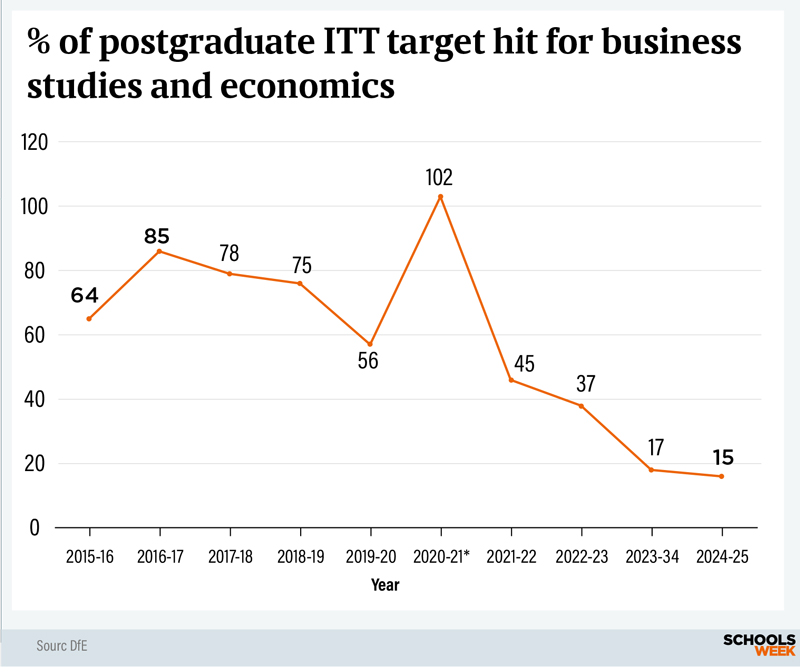More pupils are signing up to study economics and business studies, but recruitment of specialist teachers in the subjects is worsening. Lydia Chantler-Hicks investigates
Ministers should introduce a teacher training bursary for economics and business studies to ease a “chronic” shortage of teachers at a time when the subjects are growing in popularity.
A-level entries for economics rose 5.5 per cent this year, the biggest increase amongst the 10 most popular subjects.
Meanwhile, entries in business studies overtook history to become the fifth most popular A-level. Entries also rose by 3 per cent at GCSE.
But analysis by FFT Education Datalab shows that just over half of state schools offer economics A-level.
Yet recruitment for would-be teachers hit just 15 per cent of the government’s target last academic year (2024-25). This compares with an average of 62 per cent across all secondary subjects.
‘Major inequality’
Experts say a financial incentive could attract more staff to the increasingly popular subject, boost pupil take-up and help to address “major inequality”.
Leighton Chipperfield, the chief executive of the Royal Economic Society, told Schools Week he was “deeply concerned” about the shortage of economics teachers in UK state schools.
“Too often, young people are denied the chance to study economics because of this shortage — a problem felt most acutely by pupils from disadvantaged backgrounds.”
He urged the government to take “every possible step” to improve the supply of qualified teachers, including a bursary at least equivalent to those offered in other shortage subjects.
The DfE offers bursaries of between £5,000 and £29,000 for chemistry, computing, maths, physics, languages, biology, DT, geography, art and design, music, RE, and English.
Gareth Taylor, the head of professional development at The Economics, Business and Enterprise Association (EBEA), which represents economics teachers, said the subject’s rising popularity could partly be because “the message is getting through” about its financial benefits.
But the “chronic shortage” of qualified staff in state schools” created a “major inequality”, with limited access “hard-wiring income inequality into society”.
“If the government chose to fix this by introducing the kind of ITT bursary it offers in other subjects, numbers would rise still further.”
Bursary system not perfect
Emma Hollis, the chief executive of the National Association of School-Based Teacher Trainers (NASBTT), said new bursaries would “always be welcomed”, but the system had flaws.
A NASBTT member survey in spring said it “sometimes attracts candidates who are more interested in the financial incentive than in teaching, which may lead to lower-quality applicants”.
Meanwhile “fluctuating” bursaries – such as for English which has been slashed from £10,000 to £5,000 – created uncertainty and delayed applications.
Hollis said providers also argued varying bursaries felt inequitable, “implying that certain subjects are more valued than others.”
“If there is a specific need emerging for an economics/business studies ITT bursary, then of course we would support all efforts to attract additional candidates – but these issues need to be recognised and addressed.”
Major disparities in access
A Social Mobility Commission report in 2023 found economics graduates were second only to medical sciences in terms of potential lifetime earnings.
Yet it had a low “access rate” with “relatively few” 16-year-olds on free school meals studying the subject.
Adrian Lyons, a former national lead HMI for economics, business and enterprise, said schools offering economics “represent too narrow a socio-economic segment”. Pupils were “disproportionately male and from high socioeconomic groups”.

“This is then reflected at undergraduate level, postgraduate level and professional level in terms of those who give advice to politicians and policy-makers.”
A report by FFT Education Datalab, commissioned by the Bank of England in spring, found economics was offered at just over half of non-selective state schools, compared with 90 per cent of selective and 82 per cent of private schools.
It found while the cohort of pupils taking economics A-level had become more diverse, disadvantaged pupils were still less likely to take the subject.
Regional disparities
There were also “very large” regional disparities. At GCSE, 43 per cent of pupils taking economics in 2023 were from London schools, compared with just 1 per cent in the north east. At A-level, the split was 29 to 2 per cent.
There was also a large gender difference. This year, only 30 per cent of pupils taking A-level economics, and 39 per cent taking business studies, were girls.
Lyons said there were “far too few specialist economics and business teachers to match the demand”.
“The lack of bursaries for ITE in the subjects directly contributes to the massive under-recruitment where business vies with physics to win the under-recruitment league.”
There have been growing calls for better financial education in schools. Just last year, a group of MPs said ministers should “urgently” review the maths curriculum to expand financial education and make it compulsory in RSHE lessons.
Recruitment well below target
In 2024-25, recruitment for postgraduate initial teacher training (PGITT) in business studies achieved just 15 per cent of the DFE’s target – a fall from 17 per cent the year before.
Chemistry and drama had increased targets but similar entrant numbers, with business studies entrants falling from 198 to 183.
Recent analysis by Jack Worth, the lead economist at the National Foundation for Educational Research (NFER), shows ITT recruitment in England has broadly improved this year, “especially in some of the most hard to recruit subjects”.
NFER’s forecast, based on applications made up to July, shows recruitment “closer to target and back up to the relative levels seen before the pandemic”. He said “a slowing wider labour market” was “likely to be a significant driver”.
There has been a 28 per cent rise in accepted entrants for business studies this year – which includes economics in DfE metrics – with the DfE slashing its target by 25 per cent from 1,200 to 900.
Yet the NFER predicts it will still hit just 26 per cent of that target, the lowest of any subject. The foundation predicts overall secondary recruitment will hit 85 per cent, while primary will be oversubscribed by 16 per cent.
Initiative to boost take-up
The Bank of England (BoE) recently launched a partnership with the University of Manchester to increase access to economics in state schools.
The free, one-year programme due to begin in September will train existing teachers to deliver A-level economics as a second subject.
Clare Lombardelli, the bank’s deputy governor for monetary policy, said she hoped the programme would help “tap into a broader range of talent” and help more people “benefit from the opportunities that come from studying economics”.
The BoE said there had been “high” interest with all 25 places for the first year allocated. Applicants from the north west have been given priority.
Bob Hindle, a lecturer at the university and lead for the scheme, said a training bursary for economics and business studies would be “an easy fix” for recruitment issues.
He also criticised the way the DfE collected data on economics teachers. Currently, economics recruitment was included under business studies in the workforce census, but Hindle said this failed to give a clear picture of the number training to teach economics.
The DfE was approached for comment.
















Your thoughts